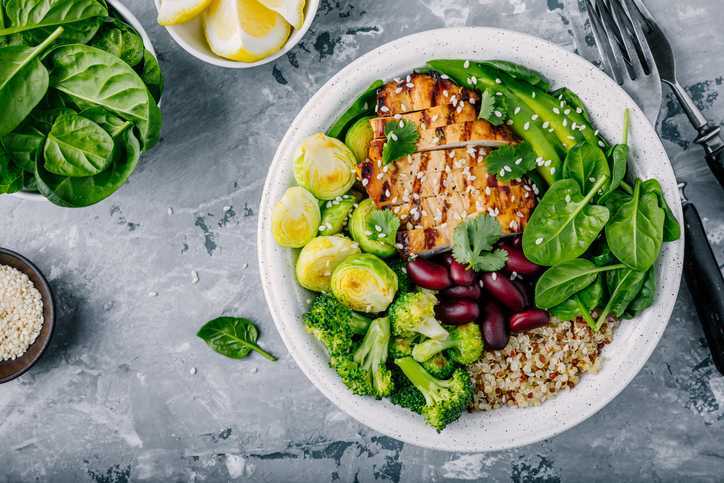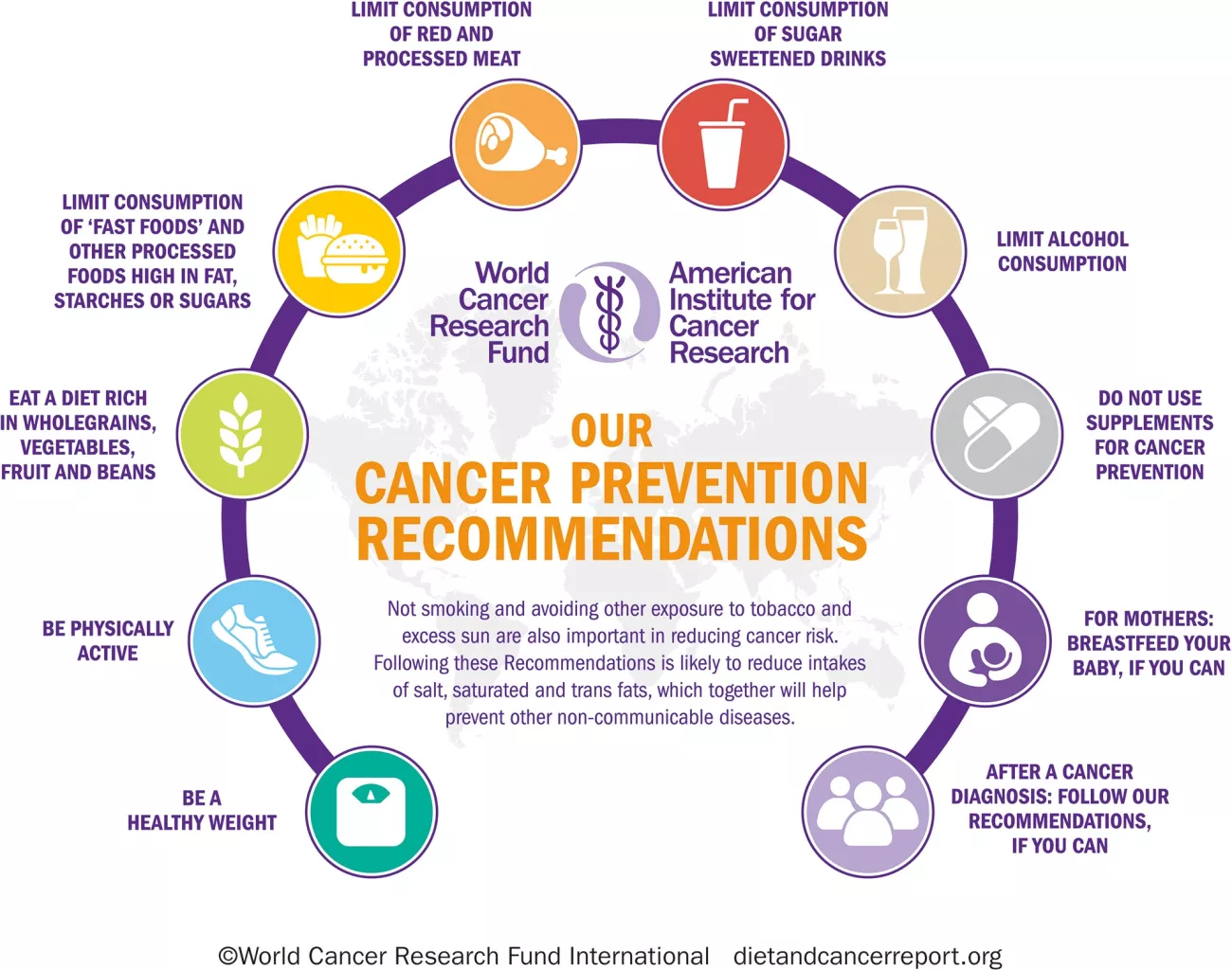- Diet alone is unable to treat or cure cancer. But there are diet and lifestyle strategies you can use to reduce your risk of developing cancer.
- To help reduce cancer risk, you should eat a healthy diet, keep a healthy body weight and exercise regularly.
- Diet and exercise are also an important part of cancer treatment. They can help you to cope and recover from any treatments, stay stronger and manage side-effects.
- When you are in treatment for cancer, the first nutrition priority is to try to meet your body’s energy, protein, and nutrient needs. For some people this may mean eating in a different way to normal. It may mean extra nutrition supplements or support feeds.
- Before you make changes to your diet, speak to an Accredited Practising Dietitian (APD). Dietitians are the practitioners in your cancer treatment team who are most qualified to provide advice on what you should eat.
- An APD will help you improve your diet, reduce potential health risks and tailor recommendations to your personal needs.
15 minute read
Diet can play a role in preventing and managing certain adult cancers. It can also reduce the risk of cancer recurrence and other long-term health issues.
But there is no credible evidence that following a restrictive or fad type of diet will help treat or cure cancer. This includes ketogenic, sugar or dairy free, alkaline, vegan or raw food diets.
Some cancers, including stomach, breast, bowel and oesophagus cancers, have been linked to certain dietary inadequacies or excesses. But there are many factors involved in the development of these diseases.
Preventative measures to reduce your risk of cancer include:
- maintaining a healthy weight
- eating a healthy diet that includes fruit, vegetables and grain rich foods
- regular physical activity.
If you have cancer, your diet provides your body with the nutrients it needs to support the immune system and fight the disease.
Your nutrition will also help you cope with treatments, side-effects and recovery.
Do I need to follow a strict diet to prevent or fight cancer?
A cancer diagnosis may make you wonder what caused the disease. Did lifestyle or diet play a part?
While diet, weight and activity levels at the larger population level has been found to contribute to around 1/3 of all adult cancers, at an individual level it is not possible or helpful to blame aspects of your lifestyle that may or may not have contributed.
It is also not helpful to follow a strict diet or to eliminate food groups to try to help treat or prevent further cancers. This is because restricting or cutting out key food groups may risk your ongoing health and result in nutrient deficiencies.
Instead, you should look at lifestyle changes that you could adopt going forward. This could include the healthy eating recommendations below. These are backed by the strongest evidence available from the world’s leading cancer nutrition research, health and medical organisations.
And if you are having trouble eating normally or have lost weight without trying, seek further support from your doctor and an APD for dietary advice tailored to your treatment needs.
Key preventative measures
- Maintain a healthy weight
-
Research has found staying at a healthy weight throughout your life is one of the best ways to protect yourself against cancer.
Evidence has linked obesity and excessive weight gain during adulthood to different types of cancer. This includes cancer of the:
- oesophagus
- pancreas
- liver
- colon and rectum
- breast
- kidney
- endometrial
- mouth
- pharynx
- larynx
- stomach
- gallbladder
- ovarian
- prostate.
The most effective way to stay within a healthy weight range include:
- eating a diet rich in whole foods such as fruit, vegetables, grain-rich or high-fibre food, mushrooms, legumes, nuts and seeds
- limiting your intake of low nutrient or energy-dense and highly processed foods
- avoiding alcohol and sugary drinks
- staying active.
- Eat more fruit and vegetables
-
Around 374,000 cancer deaths each year around the world are the result of low fruit and vegetable intake.
Many Australians don’t get enough fruit and vegetables in their diet. Data has found that around only 8% of Australians meet the recommended five serves of vegetables per day.
There’s evidence that fruit and vegetables have a protective effect against cancers, as well as weight gain and obesity. Aim to eat 2 serves of fruit and 5 serves of vegetables each day.
Easy ways to add more fruit and vegetables each day
- Add a serve of fresh, frozen or dried fruit to your breakfast cereal like sultanas, cranberries, berries, kiwi fruit, passionfruit, pineapple, pomegranate, grated apple or banana.
- Make up a bowl of fruit salad or stew up some pears or apples. Serve with some cinnamon and a dollop of Greek yoghurt.
- If making egg dishes, add in or serve them with a side of spinach leaves, chopped capsicum, tomatoes, avocado or mushrooms.
- Incorporate fermented vegetables such as sauerkraut or kimchi into your sandwiches or on snacks.
- Keep some of the pre-washed bags of spinach leaves, coleslaw or stir-fry medleys or jars of grilled vegetables in the fridge or make them up yourself. Add a good handful or two into your dinner meals, sandwiches or snacks. Vegetable or salad mixes are also an easy way to top up the vegetable serves in any takeaway or ready meals.
- At the start of the week roast a tray of mixed root vegetables. Store in the fridge and use as a side to lunch and dinner meals. Options can include sweet potato, pumpkin, egg plant, zucchini, fennel, corn or beetroot.
- Moisten your homemade or packet mix desserts, puddings, slices or cakes with extra fruit or grated vegetables such as pear, apple, carrot or zucchini.
- If making soups, curries, mince-based dishes, stews or pasta add in extra grated or chopped vegetables such as carrots, zucchini, celery, broccoli, kale or cauliflower. You could also try mixing in a can of legumes such as lentils, chickpeas, cannellini or kidney beans.
- Boost the umami taste of minced meals and replace around 1/3 of the meat portion with a punnet of finely chopped or blended mushrooms.
- Put out a plate of chopped vegetables with a hummus type dip to snack on when cooking dinner or for the kids to pick at.
Remember, fruit and vegetables are best bought when they are in season. Otherwise try frozen or canned vegetables as they are just as nutritious and budget-friendly as well.
If you are someone who doesn’t look forward to eating fruit or vegetables, start slowly with those you do like. Try serving, flavouring, or cooking them in different ways. You can also disguise them in sauces, minced meals, or curries.
- Eat more whole grains, legumes and high-fibre foods
-
Whole grains and legumes should be a major part of your daily diet. These foods are high in fibre, as are fruits and vegetables. High-fibre foods can reduce your risk of gastric and colorectal cancers. Learn more about fibre.
Whole grains, in particular, protect against colorectal cancer. They also help prevent weight gain, support digestion and gut health.
Aim to include some high-fibre foods in each of your main meals and snacks. This will help you to reach the recommended target of 30g in your diet each day. Higher fibre food options include:
- whole-grain cereals, brown rice, oats, barley and quinoa
- legumes including lentils, chickpeas, baked beans and kidney beans
- fruits and vegetables (keep the skin on where possible)
- mushrooms
- psyllium husk
- nuts and seeds.
Easy ways to eat more whole grains, legumes and high-fibre foods
- Start by choosing a fibre rich or whole-grain cereal, whole oats or whole-grain toast option for breakfast. Aim for a dietary fibre content per serve of at least 3-5g per serving.
- Add a mix of seeds such as linseed, pumpkin, sesame or chia into any breakfast bowl, salads or as a toast or snack topper.
- Choose whole-grain bread varieties (with seeds in the bread) over white or refined whole meal types. Enjoy a mix of grain-rich breads, rolls, wraps, bagels, pasta, crackers and rice. If you don’t like grainy cereal foods, try working them in slowly by mixing half and half. For example, try cooking half brown and half white rice.
- Mix in tinned lentils, kidney beans or chickpeas into meat or chicken meals such as bolognaise, chili con carne or curries. This is a cost-effective way to extend the protein rich foods in the meal.
- To add protein into your salad, mix in some drained canned or soaked lentils or other bean mixes. They go well with roasted vegetables, some goats cheese, spinach or rocket leaves and a splash of balsamic vinegar.
- Experiment with other grains such as quinoa, buckwheat, couscous, freekeh, barley or rye.
- Use whole-grain crackers or baked type grain snacks.
- Popcorn is another tasty whole-grain snack. You can either air-cook corn kernels in a covered pot in the microwave or with a dash of oil in a saucepan. Try it with fresh flavours such as chili powder and a squeeze of lime, cinnamon and a sprinkle of sugar, or grated parmesan cheese with oregano. Otherwise enjoy snacks with whole grain wheat or rye crispbreads.
- Eat more plant-based foods
-
Plant-based foods include fruits, vegetables and whole grains. These foods protect against a host of cancers as they provide many important phyto-nutrients. There’s a strong link between an increase in their consumption and reduced cancer risk.
Increasing your intake of non-starchy vegetables and fruit protects against various cancers. This includes breast cancer and cancers of the respiratory and digestive tracts.
If your aim is to prevent cancer and you are not experiencing any eating or digestive difficulties, fill your plate with ½ vegetables, ¼ grain foods and ¼ protein rich foods.
Protein rich foods include lean meat, poultry, fish, seafood, legumes, tofu, nuts, seeds and dairy foods or alternates.

- Limit intake of low-nutrient and energy-dense, fast or highly processed foods
-
Fast and highly processed foods are generally:
- low in essential nutrients
- high in energy or food kilojoules
- high in unhealthy fats, such as trans and saturated fats
- high in refined starches or sugars.
Eating a lot of these foods is linked to obesity and higher risks of cancer.
There’s also evidence that the increase in blood sugar and insulin after eating an energy-dense or high glycaemic index meal is linked to some cancers.
These foods are often high in energy (kilojoules), sugars, unhealthy fats and salt. They may also have undergone a lot of processing, leaving them high in energy and low in nutritional value.
Reducing these foods can help you control your energy intake and stay at a healthy weight. This reduces your risk of many cancers.
There is no need to avoid all foods high in fat. It is important to include foods rich in healthy fats, such as oily fish, avocado, nuts, seeds and extra virgin olive oil. Learn more about healthy fats.
- Watch your salt intake
-
Excess salt intake from salty or processed foods, or added to foods, is linked to stomach cancer. Because processed and fast foods tend to be high in salt, you should limit your intake.
Reduce your salt intake by using herbs and spices in cooking. Limit salt added to cooking and at the table. Choose products that are reduced salt and have less than 400mg sodium per 100g product.
Learn more about salt and how to reduce your intake.
- Avoid sugary drinks and alcohol
-
Swap sugary drinks for water or unsweetened drinks. Sugary drinks can cause weight gain and obesity, increasing the risk of many cancers. These include mouth, stomach, pancreas, ovary and kidney cancers. Learn more about sugary drinks.
Try to reduce added sugar in coffee and tea. Limit your intake of fruit juices and other sweetened drinks to prevent excess calorie intake.
When it comes to preventing cancer, it’s also best to avoid alcohol. Evidence shows alcohol may contribute to cancers of the mouth, pharynx, larynx, oesophagus, liver, lung, pancreas, colon, rectum, breast and stomach. This applies to all types of alcohol, whether it is beer, wine or spirits.
The key factor is the 'amount' of alcohol you drink. There’s actually no ‘safe‘ level of alcohol consumption. Any reduction is a positive move for your health.
Tips to reduce your alcohol intake
- Reduce the number of days you drink by having some alcohol-free days.
- Try the no or low alcohol drink varieties.
- Substitute or alternate alcoholic drinks with a sugar-free flavoured soda, soft or sparkling mineral water.
- Be aware of friends or family members who may pressure you to drink more or to buy another round.
- If you are concerned about how much alcohol you drink, or if you feel you may be alcohol dependent, talk to your GP or seek the help of a qualified counsellor.
-
Limit red and processed meats
-
Evidence suggests red meats and processed meats are linked to colorectal cancer. They may also be linked to head and neck, oesophageal, lung, pancreatic and stomach cancers.
This doesn’t mean you have to give up red meat completely. It’s a good source of protein, iron, zinc and vitamin B12.
Instead, eat smaller serves, aiming for no more than 350-450g of cooked lean red meat each week. You can also stretch your meat allowance by adding plant-based sources of protein such as legumes, mushrooms, nuts, tofu or dairy products.
Enjoy these red meat alternatives:
- Shaved turkey breast
- Shredded chicken
- Falafel
- Legumes such as lentils, chickpeas and kidney beans
- Marinated tofu
- Grilled mushrooms
- Goats cheese or haloumi.
Also try to avoid or reduce your processed meat intake. Processed meats also contain chemicals called nitrates. Nitrates are added to keep processed meat fresher for longer. These chemicals can be converted into cancer causing agents. Processed meats include bacon, ham, salami and some sausages.
These meats are also high in sodium and calories. They can contribute to heart disease, diabetes and obesity.
- Choose whole foods over supplements
-
High-dose supplements are not recommended. They are far less effective in preventing cancer than a healthy, nutritious diet. It’s better to get the nutrients you need from whole food sources than to look to vitamins and supplements to fill nutrient deficiencies.
If you are taking or considering a vitamin, mineral or herbal supplement, speak with an APD to ensure this is safe with your cancer treatment and medications.
-
Promote breasfeeding
-
Breastfeeding is beneficial for both mother and baby. It can protect against breast cancer. It also lowers the mother’s risk of type 2 diabetes and obesity, further reducing the risk of cancer.
For the baby, breastfeeding promotes healthy growth and immune system development. It also reduces the child’s risk of obesity and weight gain later in life, reducing the child's risk of cancer.
Cancer prevention dietary strategies: a summary
Do:
- enjoy a variety of vegetables, fruit, legumes, nuts, seeds, mushrooms, and other plant-based foods
- try to eat at least 5 servings of vegetables and 2 servings of fruit daily (can include fresh, frozen, canned or dried varieties)
- include a serve of high fibre or grain rich foods as part of your meals and snacks across the day.
Reduce:
- fast and processed foods
- sugary or sweetened drinks
- alcohol
- red meat (limit to around 350-450g cooked weight per week)
- highly processed meats
- excess salt intake (from processed foods or adding salt to foods).

This material has been reproduced from the World Cancer Research Fund/American Institute for Cancer Research. Diet, Nutrition, Physical Activity and Cancer: A Global Perspective. Continuous Update Project Expert Report 2018. Available at dietandcancerreport.org.
Learn more about how to reduce your cancer risk with your diet on the World Cancer Research Fund website.
If you’ve been diagnosed with cancer
Cancer and its treatment place major demands on your body – physically, mentally and nutritionally. There are things you can do to support your body and recovery during this time.
Diet and exercise play a significant role during cancer treatment and management. You should speak to an APD about your diet, and a physiotherapist or exercise physiologist about movement and exercise.

Eat well
Eating well during and after cancer treatment can help you:
- stay energised
- keep your immune system strong
- reduce muscle or weight losses
- reduce treatment-related side effects
- boost your mood and quality of life.
All can help you tolerate the best treatment doses and speed up your recovery.
Good nutrition can also reduce problems and hospital admissions by:
- healing wounds
- repairing damaged tissues
- supporting your immune system
- reducing the risk of cancer returning
- reducing the risk of other chronic health issues or conditions
- helping you better manage any side-effects or difficulties eating.
Exercise
Staying active during and after treatment can:
- strengthen your muscles and bones
- reduce your risk of developing new cancers or other health complications
- improve energy, mood and circulation
- reduce stress and fatigue
- help you tolerate your treatments.
Nutritional needs throughout different phases of cancer
During cancer treatment and recovery, your body will have different nutritional needs. To support your body and speed up repair, focus on your diet and make sure you’re meeting your needs. Speak to an APD to get the right advice for you.
- During treatment
-
You might need more protein and energy (calories) during treatment to prevent weight and/or muscle loss. Try eating smaller, more regular meals, or adding regular snacks into your day. Include foods rich in protein and energy regularly across the day.
Tips for boosting energy and protein in your diet
- Choose full-fat milks and dairy foods.
- Fortify milk with extra protein by adding 1-2 scoops of a protein powder or skim milk powder into 500mls of milk. The fortified milk can be used in your cereal, tea or coffee, smoothies, soups or in milk-based sauces.
- Add a handful of nuts, a tablespoon of almond meal or spoon of a nut butter (such as peanut or almond butter) into meals, smoothies or porridge mixtures.
- Add an extra dollop of butter, olive oil, sour cream, mayonnaise, natural yoghurt or oil-based dressing.
- Sprinkle a handful of grated cheese onto vegetables such as potato, greens or cauliflower. Add cheddar, feta or cottage cheese into salads, sauces, pastas, sandwiches and on crackers.
- Nibble on a small antipasto plate with some cheese, olives, dips, pate, grapes, crackers and cold meats or smoked salmon.
- If you feel nauseous nibble on salty foods such as a small packet of potato chips, pretzels or corn chips.
- If you prefer sweeter foods try a dessert or pudding as a snack or for after dinner. Options can include custard, rice pudding or ice cream. Try with some stewed or canned fruit.
- Avoid filling up on too much tea, coffee or water. Instead substitute with milk drinks or alternates or juice-based drinks. These can count as part of your recommended fluid intake.
- Take some easy to eat or portable snacks when you are heading off to treatments or medical appointments. Options can include muesli bars, energy balls, muffins, breakfast drinks, milkshakes or try a milk-based coffee.
- An APD can also help you with other nourishing drink recipes or ready-made higher calorie and protein drink options.
If you have lost weight or have any concerns about your eating or drinking, you should speak to an APD. They can provide advice on the best dietary support options so you can continue to eat well.
Dietitians Australia advocates for the regular nutrition health screening of all individuals in treatment for cancer. Learn more about the symptoms and risks of malnutrition.
Diet modifications and supplements
If you have a sore mouth, or are having trouble swallowing or digesting your food, you may need specific diet and texture modifications. You may also need nutritional supplement drinks or tube feeds.
While this may seem overwhelming to manage at first, you will do much better (and feel better as well) if you can meet all your daily energy and nutrient needs. Your dietitian will support you if you need this extra nutritional support.
Before starting any vitamin, mineral or supplement, speak with your doctor, pharmacist or dietitian. Some supplements can affect or interact with your medical treatments. It is very important to inform the team of anything you are taking.
A dietitian will also be able to assess your current diet to work out whether you need any extra supplements and the appropriate doses. They can also help you adjust your usual diet so that you can get any nutrients that may be low or deficient from whole foods. This is generally the better option for you and your body.
- After treatment
-
Eat a variety of foods to manage your weight and speed up your recovery. Try to do some physical activity to rebuild your muscles and help you bounce back from the side effects of treatment. Speak to a dietitian about advice specific for your diagnosis and on-going health needs.
- Recovery
-
Focus on eating healthily once you’ve recovered from the side effects of your treatment. Prioritise plant-based foods including fruits, vegetables, legumes and whole grains. Balance these foods with those that provide protein and other essential body strength nutrients such as iron, zinc, B12 and calcium.
You should also try to stay active and exercise regularly. Aim for 2.5 to 5 hours of moderate activity each week.

We recommend seeing a dietitian if you:
- are concerned about your diet and lifestyle putting you at higher risk of developing cancer
- have been diagnosed with cancer
- are undergoing cancer treatment
- are recovering from cancer or treatment
- would like a personalised eating plan to ensure you're actively reducing your risk of the disease
- want personalised advice from a professional on healthy eating and lifestyle habits
- want personalised advice to improve your energy levels, strength and daily function
- have lost weight without trying
- are eating poorly because of a reduced appetite or ability to eat
- are experiencing symptoms that are associated with or impact your eating (for example, mouth sores, nausea, vomiting, taste changes, diarrhoea, constipation)
- have changed your eating pattern from usual or are cutting out food groups or nutrients
- are taking any vitamins, minerals, herbal or other supplements that may interfere with your cancer treatment.
Accredited Practising Dietitians (APDs) are university-trained nutrition experts. They can provide evidence-based nutrition advice tailored to your personal needs and circumstances. They also know about your changing nutrition needs during the different stages of the cancer experience. They can help you with everyday menus, recipes and snack ideas.
- Prioritise whole grains, fruit and vegetables, legumes, mushrooms, nuts, seeds and other plant-based foods.
- Eat at least 5 servings of vegetables and 2 servings of fruit daily.
- Maintain a healthy weight or try to work towards a healthier weight for you.
- Reduce your red meat intake to around 350-450g a week. Try introducing a 'meat-free Monday' or increase your use of beans, legumes and mushrooms. You can also include fish or poultry.
- Avoid processed meats.
- Avoid excess salt intake (from processed foods or adding salt to foods during cooking or at the table).
- Reduce fast foods and processed foods, sugary or sweetened drinks and alcohol.
- Stay active, aiming for at least 2.5 - 5 hours of moderate activity each week.